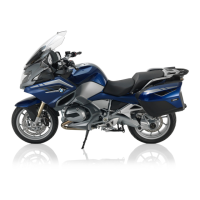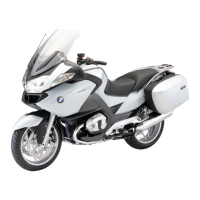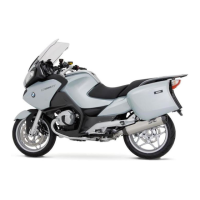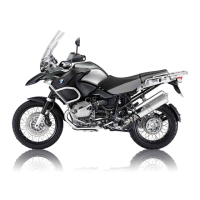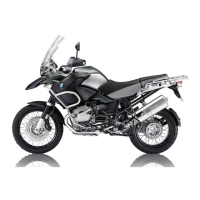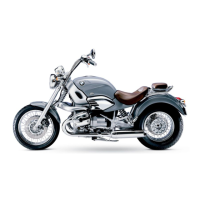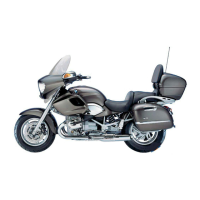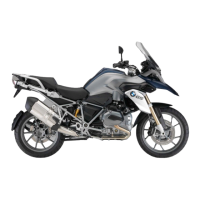Do you have a question about the BMW R 1200 RT 2011 and is the answer not in the manual?
Provides an initial overview of the motorcycle and guides on manual usage.
Explains symbols used in the manual, including warning indicators and references.
Details optional extras (OE) and accessories (OA) offered by BMW.
Covers specifications, dimensions, and power ratings according to DIN standards.
Explains how currency standards affect motorcycle specifications and information.
Identifies and explains components visible on the left side of the motorcycle.
Identifies and explains components visible on the right side of the motorcycle.
Details the components located underneath the motorcycle seat.
Explains the controls and functions of the left-hand multifunction switch.
Explains the controls and functions of the right-hand multifunction switch.
Identifies and describes the gauges and displays on the instrument panel.
Explains the information displayed on the multifunction display.
Details the meaning and function of various warning and telltale lights.
Explains the telltale light indicating the status of the cruise control system.
Describes the indicator for upcoming scheduled maintenance.
Explains how the remaining range is calculated and displayed.
Details the ambient temperature display and its potential inaccuracies.
Explains tyre pressure readings, including those with RDC monitoring.
Provides an overview of how warnings are presented and their meanings.
Instructions on operating the ignition switch and locking the handlebars.
Guide to adjusting the display dimmer and selecting readings.
Operation of side lights, low-beam, and high-beam headlights.
Instructions for operating the heated handlebar grips.
Guide to operating the front and rear seat heating functions.
Instructions for activating and deactivating the ASC system.
Details on switching on, accelerating, decelerating, and switching off cruise control.
Guidance on adjusting brake levers and checking brake operation.
Instructions for setting and adjusting the rear suspension spring preload.
Information on checking tyre pressure and tyre recommendations.
Instructions for adjusting headlight beam throw for different riding conditions.
Essential safety advice for riders, including equipment and load considerations.
A pre-ride checklist for important functions, settings, and wear limits.
Procedure for starting the engine, including pre-ride checks and cold starts.
Guidance on the first 1000 km, including speed limits and break-in procedures.
Instructions on using the side stand and centre stand for parking.
Information on fuel types, capacity, and safe refuelling procedures.
Guidelines for safely securing the motorcycle for transport.
Explanation of the integral ABS system, its operation, and rider feedback.
Details on how the ASC system manages engine torque for stability.
Description of the RDC sensor function and tyre pressure ranges.
Explanation of the ESA II system for adapting suspension to load and conditions.
Recommendations for using BMW-approved parts and accessories.
Notes on the use of power sockets, including automatic shutdown conditions.
Instructions for opening, closing, removing, and installing the motorcycle cases.
Guide to opening, closing, removing, and installing the topcase.
Overview of straightforward maintenance procedures and torque specifications.
Lists the contents of the standard toolkit and its uses.
Instructions for checking and topping up the engine oil level.
Procedures for checking brake operation, pad thickness, and fluid levels.
Guides for replacing headlight, parking, brake, and indicator bulbs.
Maintenance instructions for the battery, including charging and jump-starting.
Recommendations for using BMW cleaning and care products.
Guidelines for washing the motorcycle, including removing road salt.
Advice on cleaning plastic parts and other easily damaged components.
Instructions for maintaining paintwork, including removing stains and waxing.
Guidance on applying protective wax coatings to the paintwork.
Procedure for preparing the motorcycle for storage.
Steps for preparing the motorcycle after storage.
Lists common starting issues and their possible causes and rectifications.
Specifications for torque values of various threaded fasteners on the motorcycle.
Detailed technical specifications of the motorcycle's engine.
Information on recommended and alternative fuel grades and capacities.
Specifications for engine oil type, capacity, and viscosity classes.
Technical details about the clutch type and its operation.
Details on the gearbox type and its transmission ratios.
Technical specifications for the final drive and rear suspension.
Specifications for the front and rear suspension systems.
Technical details on the front and rear brake systems and pad materials.
Information on tyre recommendations, wheel sizes, and tyre designations.
Specifications for on-board sockets, fuses, battery, and spark plugs.
Details about the frame type and location of identification plates.
Key dimensions of the motorcycle, including seat height and leg arc.
Information on unladen weight, gross weight, and maximum payload.
Performance specifications such as top speed.
Overview of BMW's after-sales service network and dealer capabilities.
Information on mobility services available to BMW motorcycle owners.
Details on pre-delivery checks and other scheduled maintenance tasks.
Sections for recording completed maintenance checks and services.
A table for logging maintenance, repair, and accessory installation records.
| Displacement | 1, 170 cc |
|---|---|
| Fuel System | Electronic fuel injection |
| Engine Type | Air/oil-cooled flat twin (boxer) |
| Power | 110 hp (81 kW) @ 7, 750 rpm |
| Torque | 88 lb-ft (119 Nm) @ 6000 rpm |
| Transmission | 6-speed |
| Rear Suspension | Paralever single-sided swingarm |
| Front Brakes | Dual disc, 320 mm |
| ABS | Standard |
| Fuel Capacity | 6.6 gal (25 L) |
